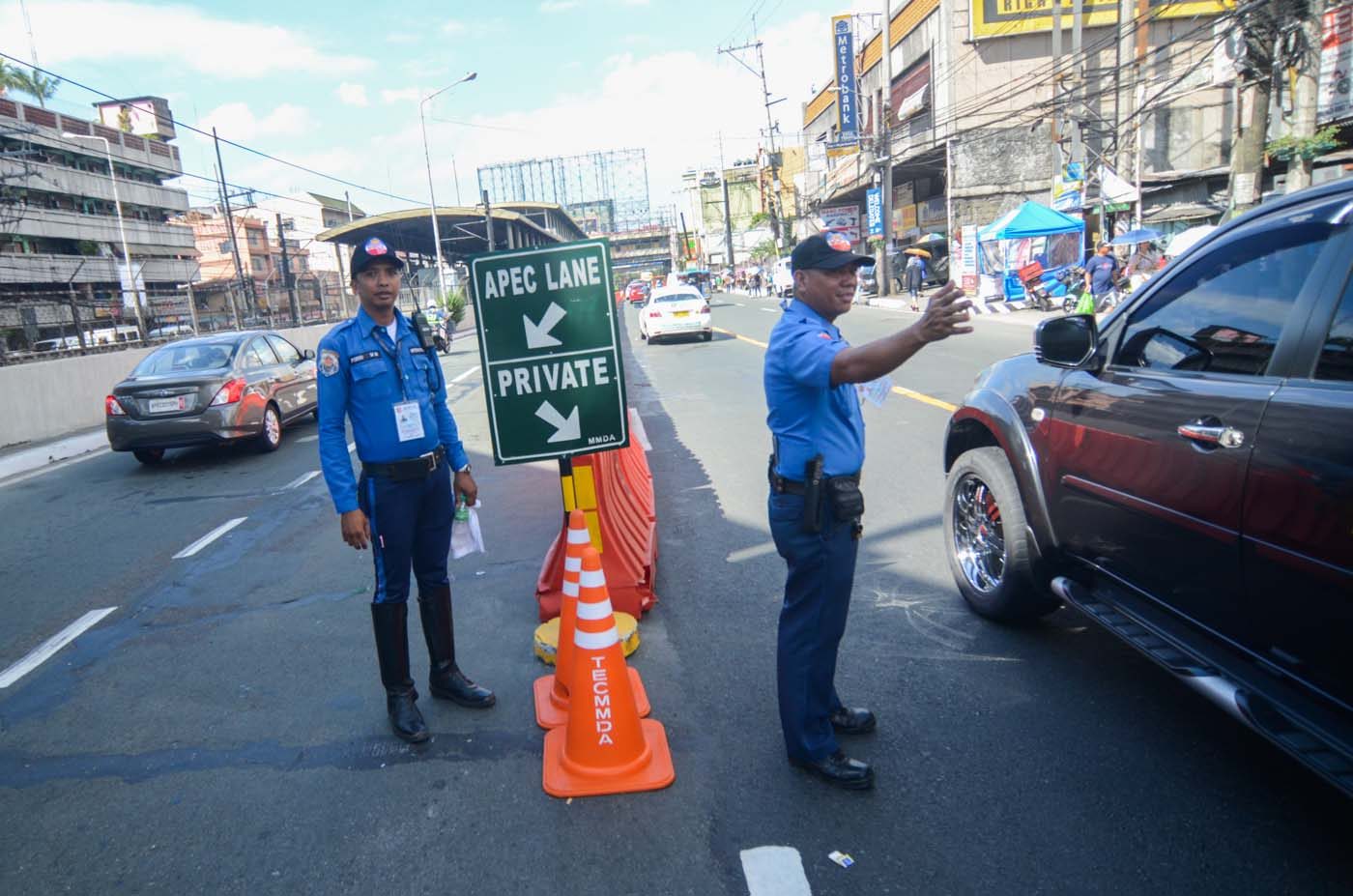SUMMARY
This is AI generated summarization, which may have errors. For context, always refer to the full article.

MANILA, Philippines – When leaders of economic powerhouses converge in a city, there will always be side stories that often grab the spotlight away from the talks, even if they involve movers and shakers in government and business.
When China played host to the Asia-Pacific Economic Cooperation (APEC) in 2014, the term “APEC blue” was coined, referring to the clear blue sky over Beijing because of measures to improve air quality in the lead-up to the meeting.
A year later in Manila, host of this year’s APEC summit, less flattering – if not worrying – buzzwords and phrases were born.
One is “The Walking Deadsa,” a play on The Walking Dead TV series and EDSA, to describe the unmoving traffic in Metro Manila’s main thoroughfare due to security preparations for the key regional event. There were rants with the hashtag #APECtado, a pun on “affected.” (READ: APEC, inclusivity, and Manila traffic)
Road closures and rereoutings resulted in hours-long traffic jams and unplanned hours-long treks under the blistering heat of the sun.
“The congestion is really difficult to predict,” Palace Communications Secretary Herminio Coloma Jr told Rappler in an interview, when asked if the government anticipated how safety measures for its high-profile guests would affect residents of the Philippine mega city.
Special “APEC lanes” were created along EDSA to ensure the unhampered passage of convoys of world leaders and top business executives.
Online and offline, Filipinos criticized the effects as relegating the citizenry into “second-class citizens.”
It’s a claim Coloma said the government doesn’t prescribe to. He urged Filipinos to showcase the traits that they’re world-famous for.
“The proper perspective would be for all Filipinos to consider themselves as a collective hosting of visitors. This is a fine opportunity for Filipinos to demonstrate the meaning of bayanihan, working together and going out of our way to manifest the warmth of our hospitality for our visitors,” he said.
Security is key
World leaders such as US President Barack Obama and Chinese President Xi Jinping are among the big names in Manila for the meeting, which the Philippines first hosted in 1996. This is its second time to play APEC host.
Where world leaders go, strict protocols follow. (READ: APEC what? An explainer on Manila’s high-profile week)
“Some of our economies here, it’s part of their requirement that where their leader is going, there should be no other vehicles moving,” Marciano Paynor Jr, head of the APEC National Organizing Council, told Rappler in a previous interview.
APEC Manila organizers and Philippine authorities have said that securing the APEC leaders is their biggest challenge.
“Understandably, inconvenience is created because the movement of the presidents and prime ministers require strict security protocol observance,” Coloma told Rappler.
The same considerations, he added, is accorded to Philippine President Bengino Aquino III when he travels overseas.
Security preparations in Manila underwent further scrutiny just the weekend before the meet, after simultaneous terrorist attacks in faraway Paris killed more than 100.
Police and the military raised alert levels earlier than planned, and Aquino himself convened his Cabinet security cluster in the immediate aftermath of the terrorist strike.
Despite heightened security alerts all over the world, police and military officials in the Philippines said they were prepared. Terrorist threats are among the things they’ve planned for since day one.
The public should understand the tight security, said Coloma, especially in light of the Paris attacks. “[The attacks underlined] the need for heightened security awareness because we could not afford to have a situation in which we will not be able to say we were less that 100% prepared,” he added.
Infrastructure, traffic, VLs
In the weeks leading up to the APEC Economic Leaders’ Meeting From November 18 to 19, government officials have been relentless in announcing planned road closures, alternate routes, and warnings to the public.
The ultimate tip from security officials themselves? Avoid leaving the house or visit the province, if possible.
It was an appeal that apparently fell on deaf ears on Monday, November 16, as traffic jams in Metro Manila, particularly in the southern part, kept motorists stuck in traffic for hours on end.
Road closures also forced commuters heading to work to walk under the hot sun. Work suspensions, after all, did not kick in until November 17 for government employees, and November 18 for the private sector.
Coloma said the original plan was for the non-working holiday to be a week long, but the private sector opposed it “because of the cost implication of having to compensate employees for paid, non-working holidays.”
By November 18, Wednesday, the first day of the APEC summit, traffic along EDSA was noticeably lighter, given work and class suspensions all throughout the metro. Inconveniences factored in, Coloma said Filipinos should look at the “long-term national interest.”
APEC is where member economies agree on initiatives to boost regional trade. On the sidelines of APEC meetings are bilateral meetings, rare opportunities for world leaders to speak one-on-one on various concerns not covered in APEC. The host government also sees it as a chance to showcase the country, the so-called “rising tiger” of Asia, to the world.
It will take another two decades before the Philippines hosts another APEC summit, as each member takes its turn.
The next biggest event set in the Philippines? An Association of Southeast Asian Nations (ASEAN) meet in 2017. – Rappler.com
Add a comment
How does this make you feel?
There are no comments yet. Add your comment to start the conversation.